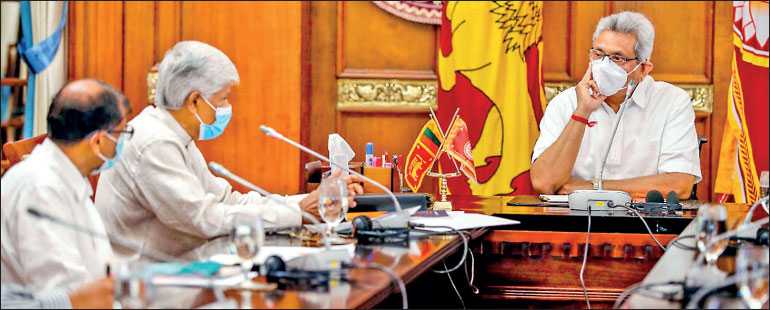Wednesday Feb 25, 2026
Wednesday Feb 25, 2026
Thursday, 21 May 2020 01:10 - - {{hitsCtrl.values.hits}}

Pathfinder Foundation Chairman Bernard Goonetilleke presents President Gotabaya Rajapaksa with a report containing a set of action-oriented recommendation. Lakshsman Kadirgamar Institute of International Relations and Strategic Studies Executive Director Dr. Ganeshan Wignaraja, and members of the study group are also seen
The Pathfinder Foundation presented President Gotabaya Rajapaksa with a report containing a set of action-oriented recommendations from an eminent persons study group aimed at steering Sri Lanka into a post-COVID-19 era of economic recovery recently.
The group suggested that Sri Lanka’s overall focus of economic policy should be on mitigating the hardship of the people, moving towards restoring economic stability in the short-run and improving the investment climate for business.
In practical terms, this means improving food security and livelihoods by modernising agricultural systems and well-targeted social protection. It also means doing whatever it takes to find the monies for debt payments and financing social welfare. Furthermore, it means cutting red tape and promoting digitisation of public services to allow the private sector to diversify and to create jobs. Finally, it means better institutional coordination for implementing economic policies and development projects.
The study group was chaired by Pathfinder Senior Fellow and former Central Bank Governor, Dr. Indrajit Coomaraswamy. Dr. Sisira Pinnawala, Department of Sociology University of Peradeniya, and Dr. Ganeshan Wignaraja, Executive Director of the Lakshsman Kadirgamar Institute of International Relations and Strategic Studies, served as the principal authors for this initiative.
Other members of the study group, included 20 leaders from academia, research and the private sector, including Prof. Sirimal Abeyratne, Dr. Sujata Gamage, Dr. Dileni Guawardena, Prof. Ariyaratne Herath, Prof. Saroj Jayasinghe, Prof. Mallika Pinnawala, Prof. Rohan Samarajiva, Krishan Balendra, Nimal Cooke, Sheran Fernando, Diren Hallock, Jiang Houliang, Murtaza Jafferjee, Mohamed Mushin, Ashroff Omar, Arun Pathak, Suren Ratwatte, Dr. Hans Wijayasuriya, Mangala Boyagoda, M.H. Jamaldeen, Ahilan Kadirgamar, Dr. Nilanga Samarasinghe, Rajendra Theagarajah and Mohamed Mushin.
The Study Group suggested that Sri Lanka’s overall focus of economic policy should be on mitigating the hardship of the people, moving towards restoring economic stability in the short-run and improving the investment climate for business.
“All countries would need to adjust to a more regional and local approach in a post-COVID-19 world. In this changed world, each country would need to develop its own social contract and formulate its development strategy autonomously. In doing so, the highest priority must be attached to making pragmatic policy choices based on a rational assessment of costs and benefits rather than on vested interests and ideological biases,” the report said.
The study recommended that in operational terms, it is helpful to think of the refined strategy in two phases. These are: (a) immediate actions to stabilise the economy (over next two to three months), and (b) items to reform the economy (beyond three months into the medium/long-term).
A mix of macroeconomic, structural, pro-poor and climate-friendly economic policies is required to build a post-COVID-19 Sri Lankan economy. These are outlined in the policy matrix below. It is also vital that such policies are properly coordinated and monitored.
It suggested that a task force of officials be appointed under the President’s Office mandated to assess the economic damage caused by the COVID-19 pandemic and to develop these ideas into an actionable national economic strategy. They could be assisted by a multidisciplinary Advisory Group of Experts who could provide technical advice and help with monitoring outcomes.
Also to establish a Committee of Secretaries of Development Ministries, chaired by the Secretary to the President, to improve consistency and predictability of policymaking as well as priority-setting and coordination for implementation.